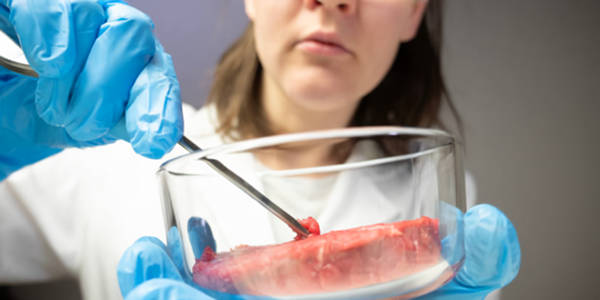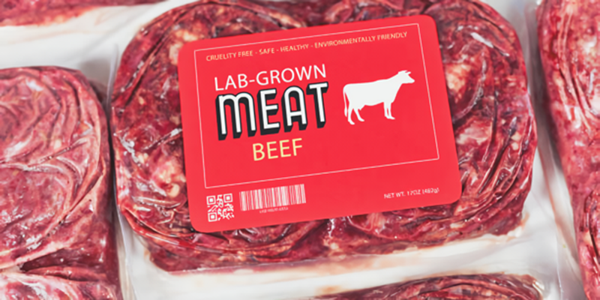Lab-Grown Meat: The Future Of Ethical Protein Consumption
Alternatively denominated as cultured meat, lab-grown meat is swiftly usurping traditional paradigms as a novel vanguard in the odyssey towards ethical protein sources. While ostensibly elementary, the concept is nothing short of revolutionary: engendering meat in vitro, thereby preventing the requisites of traditional animal husbandry and subsequent culling. This avant-garde innovation epitomizes a tectonic shift in alimentary production, dovetailing seamlessly with the prevailing sustainability and ethical consumerism zeitgeist.
Cultured Meat Benefits
Ecological Ramifications
Among the most salient benefits of cultured meat is its profound capacity to lessen the environmental externalities associated with conventional animal agriculture. The production of lab-grown meat necessitates a mere fraction of the land, aqua resources, and energetic inputs conventionally requisite, thereby precipitating a steep decline in anthropogenic greenhouse gas emissions.

Salutary Implications
The salutary benefits of cultured meat manifest conspicuously in the domain of human health. Unlike its conventionally reared counterparts, lab-grown meat can be synthesized ex nihilo, devoid of harmful antibiotics and exogenous growth hormones, thereby mitigating the pernicious risks concomitant with antibiotic resistance and endocrinological disruptions.
Zoocentric Ethicality
The ethical calculus inherent in cultured meat is unequivocal. Lab-grown meat epitomizes the quintessence of ethical food alternatives by eschewing the gory act of animal slaughter. This pioneering advancement portends a veritable renaissance in humane alimentary production, substantially attenuating the quantum of animal suffering heretofore endemic to traditional meat production.
Lab-Grown Meat Trends
Augmented Market Proliferation
The lab-grown meat industry is witnessing exponential proliferation, with an ever-expanding constellation of enterprises coalescing within this burgeoning market, diversifying their product portfolios with unprecedented celerity. Among the most salient lab-grown meat trends is the burgeoning confluence of venture capital influxes and strategic alignments with entrenched alimentary conglomerates, heralding an imminent paradigm shift towards widespread commercial enshrinement.
Technological Incunabula
Innovation remains the sine qua non of the lab-grown meat sector. Ongoing technological incunabula continuously enhances the efficacy of production methodologies, concomitantly effectuating a downward trajectory in production costs. These prevailing trends are anticipated to catalyze an inexorable price reduction, positioning lab-grown meat as a formidable contender vis-à-vis conventional meat products in the foreseeable commercial continuum.
Metamorphosing Consumer Perception
Consumer perception constitutes a pivotal variable in lab-grown meat's ascendant trajectory. As cognizance of cultured meat benefits proliferates, an increasingly sophisticated consumer base is poised to embrace lab-grown alternatives as ethically congruent food options. This paradigmatic shift is already becoming discernible, with a burgeoning demographic expressing proclivities towards incorporating lab-grown meat into their gastronomic repertoires.
Paradigmatic Transition In Protein Production
Transformational Agronomic Practices
Lab-grown meat epitomizes an epochal paradigmatic transition within agronomic practices, wherein hyper-advanced bio fabrication systems supplant archaic, resource-exorbitant methodologies. These avant-garde systems facilitate the de novo genesis of animal protein, drastically attenuating reliance on traditional livestock farming.
Pioneering Biotechnological Developments
The rise of lab-grown meat is inextricably interwoven with many pioneering biotechnological advancements. These developments encompass cutting-edge tissue scaffolding methodologies, bio-reactor miniaturization, and cellular matrix engineering, all of which are quintessential in augmenting cultured meat production's scalability and economic viability.

Ethical Protein Consumption
As societal discourses intensify surrounding the ethical ramifications of traditional meat consumption, lab-grown meat materializes as an unprecedented solution for ethical protein consumption. By eschewing the ethically fraught paradigms of animal exploitation, lab-grown meat aligns seamlessly with the burgeoning ethical consciousness pervading consumer behaviour.
Consumer Dynamics And Market Entrenchment
Evolutionary Dietary Shifts
Lab-grown meat engenders evolutionary shifts in dietary paradigms, particularly among the ethically cognizant younger demographics. As awareness of lab-grown meat trends proliferates, it is increasingly perceived as a viable alternative to traditional animal proteins. This shift transcends transient consumer trends, representing a fundamental alteration in the perception of protein consumption within the broader context of sustainability and ethicality.
Market Entrenchment And Consumer Acclimatization
A pivotal factor underpinning the widespread entrenchment of lab-grown meat is consumer acclimatization. As corporations allocate resources to marketing and educational initiatives, they demystify the intricate science underlying cultured meat, fostering heightened consumer acceptance.
Ethical Food Alternatives In Gastronomic Innovation
Integrating lab-grown meat into the vanguard of gastronomic innovation constitutes an emerging trend of notable import. Elite culinary establishments and avant-garde chefs are beginning to experiment with cultured meat, assimilating it into haute cuisine dishes that challenge and redefine traditional gastronomic conventions.
Prospective Technological Trajectories
Confluence With Regenerative Agronomy
Lab-grown meat is synergistically aligned with the tenets of regenerative agronomy, which endeavours to rehabilitate and perpetuate ecological equilibrium. Unlike traditional livestock farming, which frequently precipitates soil nutrient depletion and exacerbates erosive phenomena, lab-grown meat production necessitates minimal agronomic inputs, complementing and amplifying regenerative practices.
Advanced Cultivation Methodologies
The future trajectory of lab-grown meat cultivation is poised to encompass the refinement of cultivation methodologies to augment the complexity and heterogeneity of cultured tissues. Scientific inquiries are delving into the potential to bioengineer multi-textured cuts of meat, incorporating adipose, muscular, and connective tissues to more authentically replicate the organoleptic properties of traditional beef.
Customization Of Nutritional Profiles
Lab-grown meat offers unparalleled opportunities for customizing nutritional profiles. By precisely manipulating the cellular microenvironment during the cultivation process, it becomes feasible to enhance the nutritional valence of cultured meat by augmenting it with omega-3 fatty acids, essential vitamins, and trace minerals typically deficient in conventional meat.
Regulatory And Legislative Implications
As lab-grown meat garners broader acceptance, it necessitates a re-evaluation of extant food regulatory and legislative frameworks. Policymakers and regulatory agencies must devise and implement new protocols to ensure cultured meat products' safety, accurate labelling, and ethical marketing.
Socioeconomic Repercussions Of Lab-Grown Meat
The widescale proliferation of lab-grown meat harbours the potential to incite profound socioeconomic repercussions on a global scale. The traditional meat industry could experience significant disruptions, engendering shifts in employment paradigms, international trade dynamics, and broader economic structures.
Global Dissemination And Equitable Access
Ensuring the global dissemination and equitable access to lab-grown meat presents a formidable challenge. While initial production may be predominantly centred within technologically advanced regions, there is a difficult imperative to democratize the benefits of lab-grown meat, extending its reach to developing nations.
Conclusion
Lab-grown meat epitomizes a monumental leap forward in evolving ethical food alternatives, resonating harmoniously with the contemporary imperatives of ecological sustainability and zoocentric welfare. The benefits of cultured meat are incontrovertible: diminished ecological impact, augmented health outcomes, and ameliorated animal welfare. As lab-grown meat trends evolve, this innovative nourishing source is poised to transition from niche curiosity to mainstream staple, fundamentally reshaping the protean landscape of protein consumption in the forthcoming epoch.